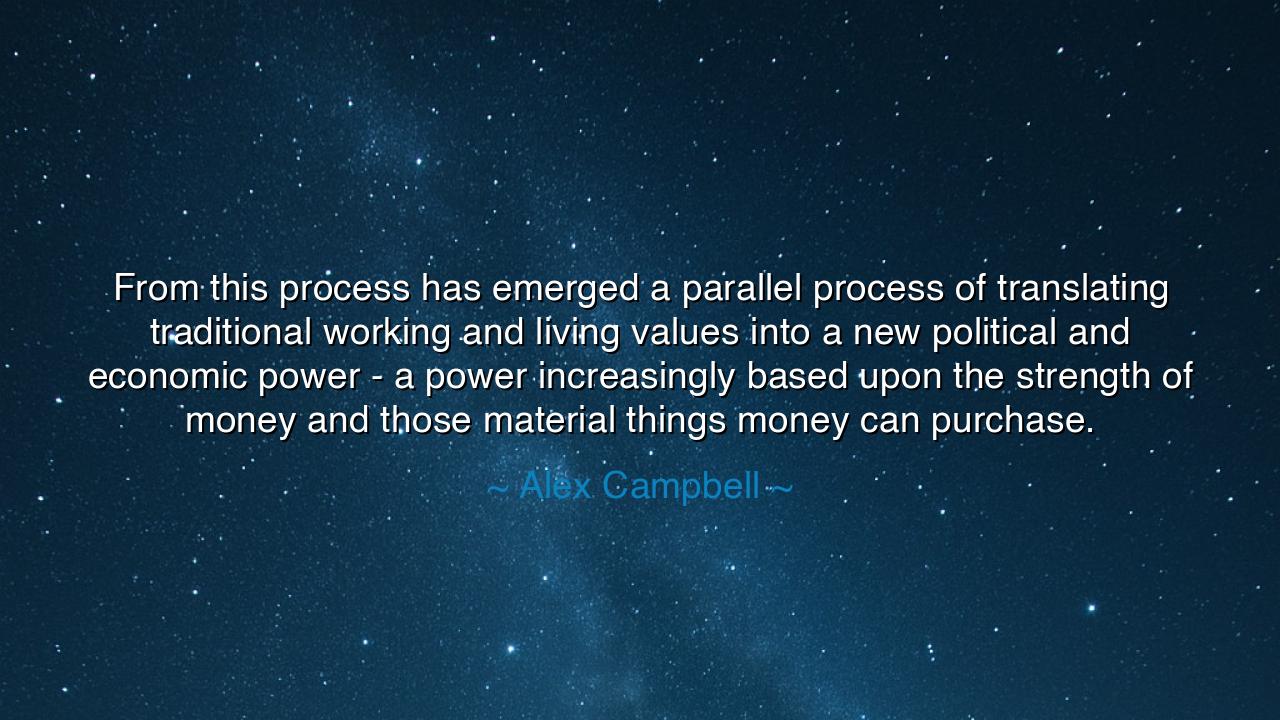
From this process has emerged a parallel process of translating
From this process has emerged a parallel process of translating traditional working and living values into a new political and economic power - a power increasingly based upon the strength of money and those material things money can purchase.






Alex Campbell once reflected on the shifting tides of society with these words: “From this process has emerged a parallel process of translating traditional working and living values into a new political and economic power—a power increasingly based upon the strength of money and those material things money can purchase.” In this statement, he does not merely describe economics, but warns of a transformation in the very soul of a people. What once was measured by labor, integrity, and community is now being transmuted into a power that flows from gold and possessions, from what is bought rather than what is lived.
The origin of this thought lies in the industrial and post-industrial ages, when societies turned from the rhythms of the land to the machinery of commerce and industry. In earlier times, the values of family, neighborliness, and toil in the fields shaped both daily life and political order. A man’s honor was tied to his word, his craft, and his kin. But as Campbell observed, these traditional values began to be translated into a different language—the language of markets, profits, and material acquisition. Where once wealth was measured by strength of community and fruitfulness of labor, it became measured by the strength of money itself.
This transformation can be seen in the rise of the great merchant cities—Venice, Amsterdam, London—where political influence shifted from nobles and warriors to bankers, traders, and financiers. The sword gave way to the coin, and the crown bowed to the merchant’s ledger. The material things money could purchase became not just symbols of wealth, but instruments of political and social power. A palace, a fleet of ships, or even a newspaper bought with coin could sway more hearts and destinies than the most eloquent speech or the most ancient title.
History also gives us warnings of imbalance. In Rome, once a republic of hardy farmers and citizen-soldiers, power shifted to those who wielded wealth. The old virtues of simplicity and civic duty decayed, replaced by luxury, greed, and dependence on material riches. Bread and circuses purchased loyalty, but at the cost of the republic’s soul. Campbell’s observation mirrors this truth: when values are translated into material power, the danger is that substance is lost, and society becomes enslaved to what money can buy rather than what virtue can build.
Yet we must not think this shift wholly evil. The translation of values into economic power can also create opportunity, lifting many from poverty and giving voices to those once silenced. Workers who once had only toil gained political strength through their collective wealth and organization. Communities harnessed resources to build schools, hospitals, and institutions of justice. The danger lies not in the use of wealth, but in the worship of it—in forgetting that money is but a tool, while virtue and community remain the foundation.
The lesson for us is clear: guard the heart against the illusion that strength of money is the same as strength of character. Wealth may purchase influence, but it cannot buy wisdom. Possessions may grant comfort, but they cannot replace honor. A nation may wield immense economic power, but if it forgets the traditional values of justice, compassion, and integrity, it will collapse from within. We must remember that material wealth must serve moral purpose, or it becomes corruption rather than strength.
So let Alex Campbell’s words endure as a teaching: recognize the transformations of our age, but do not surrender to them blindly. Use money as a servant, not as a master. Let your strength be measured not only by what you can purchase, but by what you can build in others: trust, dignity, and shared purpose. For when material things pass away, only the values of the spirit remain. And those values, translated into action, are the true foundation of power that no decay can touch.






AAdministratorAdministrator
Welcome, honored guests. Please leave a comment, we will respond soon